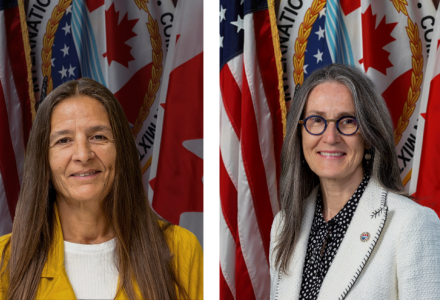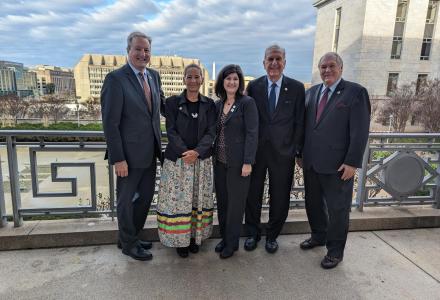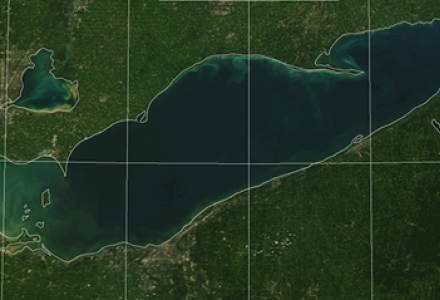
The IJC sent a binational delegation of Commissioners and staff to attend the United Nations (UN) 2023 Water Conference in New York City earlier this year. It was the first UN Water Conference since 1977.
About 10,000 international attendees gathered over three days to discuss increasing global efforts to address water and sanitation crises and ensure equitable access for all. Transboundary water issues figured prominently in the agenda, as reported previously in an article on major takeaways from the conference.
Many of the principles of cooperation promoted by the UN are supported along the Canada-United States shared border through the IJC’s International Watersheds Initiative (IWI), which celebrates its 25th anniversary in 2023.
Of particular note was the convening on “Water for Cooperation.” Focused on transboundary and international water cooperation, the discussion served as one of five themed “interactive dialogues” in the official program of the conference. This meeting, ran by Serigne Mbaye Thiam of Senegal and Christian Frutiger of Switzerland, included official statements from Vietnam, Turkiye, Pakistan, Austria, and the United States.
The key messages (found in the Water for Cooperation meeting listed in the conference’s summary report) align closely with principles behind the IWI. Notes from the meeting indicate that 153 countries share waterways or aquifers, including an estimated 310 river basins and 468 aquifers. Furthermore, climate change, population growth, land use changes and environmental impacts all present challenges that can lead to water-related conflicts and disputes if left unmanaged.

A map of all shared surface waters and aquifers across the globe. Credit: United Nations
Session discussions highlighted the value of transboundary water cooperation, noting that these cooperative efforts should include Indigenous peoples, residents and stakeholder groups such as industry, agriculture and environmental organizations.
Attendees also noted that watershed-scale management organizations are “veritable agents of peace” that should be strengthened, compared to relying on strict political boundaries. The UN secretariat’s concept paper for the discussion further indicated the importance of cooperative scientific research and expertise that includes both Western scientific methods and Indigenous ecological knowledge.
On all of these points, the IWI’s principles serve as an excellent example of how successful this kind of cooperative management can be. The IWI’s integrated ecosystem approach looks at watersheds as a whole, and advocates for considering all aspects of the ecosystem in Canada and the United States when resolving problems and making management decisions.
Inclusivity and public involvement also are key IWI principles.
The IJC’s watershed boards include members from a range of state, provincial and federal government agencies that handle topics from infrastructure and environment to agriculture and transportation. These boards include members from local communities, Indigenous nations and research institutions. This range of expertise allows for diverse views, expert knowledge from all corners and fulsome discussions when making decisions on areas of study, recommendations and water management.
One example of bringing diverse perspectives together to benefit watershed issues is the ongoing project in the Rainy-Lake of the Woods basin to recommend new water quality objectives and alert levels. The International Rainy-Lake of the Woods Watershed Board has members and advisory groups from across the basin to help formulate recommendations to the IJC and the Canadian and US governments.
Another example is the International St. Croix River Watershed Board’s study on fish passage up and down the river, carried out in conjunction with Indigenous nations, New Brunswick Power, state, provincial, and local and environmental groups.

IJC Commissioners Rob Sisson and Merrell-Ann Phare give a welcome address during the Water Diplomacy Symposium, hosted by the Women in Water Diplomacy Network on the sidelines of the UN Water Conference. Credit: IJC
The UN session also noted how climate adaptation, climate mitigation measures and local resiliency depend on cooperation in transboundary watersheds.
This is another sector where IWI has been leading, with adaptive management as one of its guiding principles. Adaptive management means recognizing that ecosystems are constantly changing, particularly due to climate change and land use practices, and that the needs of those in the basin are always evolving.
In recognizing this, adaptive management means boards should regularly assess how effective their current practices and decisions are over time with new data, knowledge and science, so that they can ensure that they can meet their responsibilities.
One such example is the Climate Change Guidance Framework (CCGF) that IJC boards have been following to study how climate change may impact the IJC’s responsibilities in their basin.
The International St. Croix River Watershed Board completed its first climate assessment following the CCGF in 2018, and the International Rainy-Lake of the Woods Watershed Board has also completed elements of the framework; CCGF work is underway in western basins such as Osoyoos Lake and Kootenay Lake. The Rainy-Lake of the Woods board’s water quality objectives and alerts project falls into this space, as does the Accredited Officers of the St. Mary and Milk Rivers consumptive use study, which is using decades of data to better estimate how much water is consumed or evaporated along those shared waterways.
The UN session recognized that this sort of cooperation is a long-term effort made up of small steps with opportunities for dialogue outside of formal meetings. The IWI recognizes this as well, as having “open and respectful dialogues” is among its guiding principles.
The IWI promotes building trust and understanding while engaging with rightsholders and stakeholders. While consensus may not always be possible, it should be important that everyone is heard and their views considered. The IWI also has supported other approaches outside of formal meetings for this kind of work, such as the International Osoyoos Lake Board of Control’s support for the Osoyoos Lake Water Science Forum in 2007, 2011, 2015 and 2022.
With the abundance of shared waters across the globe, the IJC and its IWI serve as excellent examples of how countries and communities can work together to ensure that these precious resources are managed most effectively for everyone’s benefit. The key points coming out of the UN Water Conference include a recognition that water is a connecting factor for all people, a common element for development and that successful co-management of water is an important way to avoid conflicts.

Kevin Bunch is a writer-communications specialist at the IJC’s US Section office in Washington, D.C.




